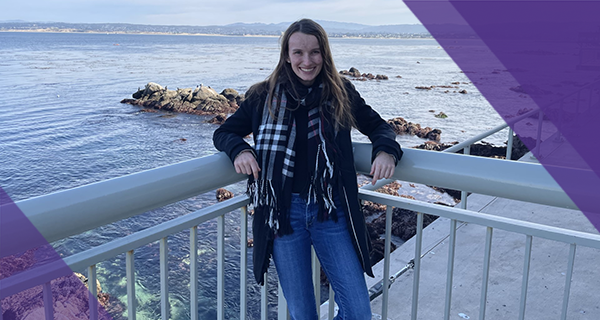Lauren Simitz ’21

What have you been up to since graduation?
I caught the “grown-up” version of rocket-science fever late as an undergrad and ignored my usual rational engineering brain to chase that crazy passion. The Northwestern article, “Grad set to launch with SpaceX” tells the rest of the story, with me at SpaceX post-graduation. From Cape Canaveral, Florida, and Boca Chica, Texas, I supported weekly launches and the development of Starship, the most powerful rocket to ever fly in space and targeting eventual flight to Mars, with a focus on the Raptor engines.
I loved working at SpaceX. It is hard to describe the crazy mix of adrenaline, curiosity, and camaraderie that working at such an innovative and fast-paced space company brings. I grew so much, personally and professionally. Like many, I graduated carrying the burnout of multiple STEM degrees and feelings of isolation from the pandemic. However, when I—and all the people in my life who have lifted me up and taken chances on me—watched components I have built fly to space, function, and then be reflown, it made everything worthwhile.
Through that experience, I realized how much I missed research and uncovering new knowledge about how physical phenomena evolve. So, I willingly put myself through college admissions part two (again, against my rational brain), and now I just passed the halfway point for my PhD in aeronautics and astronautics at Stanford. My research focuses on understanding reacting fluid dynamics with applications to rocket engine design, clean power generation, and wildfire suppression. Combining my lifelong passion in sustainability and newfound fascination with high-speed flying vehicles, continuing to learn and contribute new knowledge—I couldn’t be happier, even if my friends and family (lovingly) give me a hard time for being in school until I’m basically 30. And while I miss SpaceX, I still have ties to industry, working part-time at Boeing on their propulsion thermal analysis team for their commercial aircraft.
Regardless of how my career is going, my athletic identity will always be extremely important to me. If anything, the flexibility of graduate school and beautiful California weather (sorry Chicago!) has strengthened this: running faster distance races, playing better ultimate frisbee, and seeing more of the natural world with friends through hiking, trail running, and camping. In pursuit of healthy balance, I fuel my caloric expenditures with a lot of travel-inspired cooking/baking and spend my downtime reading, watching low-budget sci-fi movies, and playing board games with friends.
Who made an impact on your life at Northwestern?
Honestly, I had a really tough time at Northwestern. I was dealing with a lot in my personal life financially and health-wise as I was adjusting to a new environment and academic rigor. And then when I switched fields very late, it finally felt right but I was beyond anxious about the huge risk I was taking. Would I find work with my background? Would a PhD program admit me from a different major?
I am where I am today because of an army of people who invested in me, advocated for me, and made me feel seen and heard in a school of thousands of incredibly talented students. Dr. Evangeline Su, and Professors Jeffery Richards, Linda Broadbelt, Emma DeCosta, Jennifer Cole, Steven Jacobsen, John Anderson, John Lake, Bill Halperin, Kathleen Carmichael, and Trish Beddows have my utmost gratitude. They demonstrate the best parts of academia and that contributed to me pursuing a PhD.
My peers are just as inspiring. I loved the work I did and the friends I met through Associated Student Government's Sustainability Committee, Engineers for a Sustainable World, and Design for America. I also have a special love for my incredible Slivka suitemates, who I still talk to at least monthly, my chemical engineering cohort, and Sara McCoy.
What does success look like to you?
In undergrad, success seems more well-defined. There is an academic pressure to get good grades and land prestigious opportunities in your field. Working in industry and on my PhD has humbled me in that it makes me realize I know a lot less about “getting it right” than I thought straight out of school. All my carefully laid 10-year plans have been written over and smudged. And that is okay!
In the “Designing Your Life” course, there was a term, wayfinding, that stuck a lot with me. I took it as the idea that using your intellectual curiosity and personal needs (health, finance, etc.) as a compass, you always try to navigate toward opportunities that feel most aligned. You don't have the map charted for how to get to the point, just a direction. And like how the real magnetic north drifts, so does your compass of wants and needs, so you make frequent adjustments. I try to do this as best as I can, celebrating the wins along the way and learning from the mistakes I inevitably make as I learn to better follow its directions. I think a person who can wayfind toward goals and be adaptable with the path will find more success.